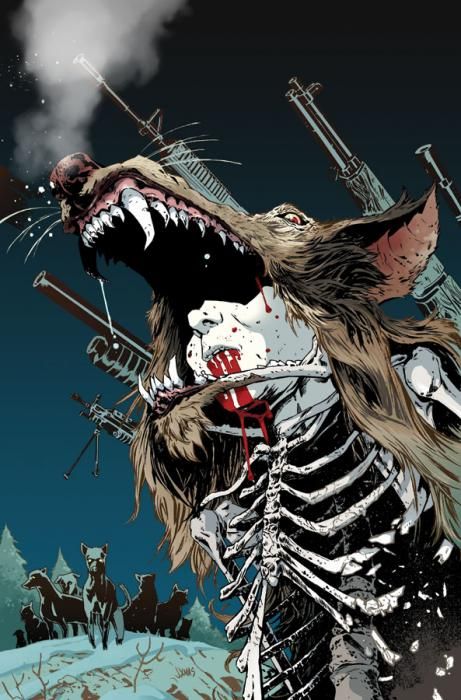In "Sheltered" #4 by Ed Brisson and Johnnie Christmas, it is weeks after all the parents of Safe Haven have been eliminated. The volcano eruption that was the centerpiece of Lucas' coup d'etat has failed to occur, and thus his tenuous hold on the other children has begun to fray.
Brisson begins "Sheltered" #4 with two spontaneous conferences, one between two boys who still trust in Lucas but who have discovered that he has destroyed all the devices of communication with the outside world, and another between a restless Victoria and Hailey who are still hiding out in bunker. Christmas' storytelling shines in a one-page silent sequence in which Lucas becomes alarmed while watching two children break off from a crowd and happily talking. Christmas' facial expressions and camera angles make Lucas' paranoia about conspiracy is clear as day. Chankhamma's color palette of naturals and dark hues emphasizes Christmas' spare line and Safe Haven's isolation.
Brisson's assumptions about the potential for chaos and power lust in children echo Golding's "The Lord of the Flies." Lucas is believable, partly because of Christmas' art and partly because Brisson has made him so childishly shortsighted in his strategy. The centerpiece of Lucas' reasoning is a natural disaster that he can neither force nor time. He seems to have cultivated no one who is dedicated to helping him maintain his power in return for power. In other words, to draw a comparison to "Harry Potter," this Voldemort has no thuggish or ambitious Deatheaters. His henchmen are tied to him only by the delicate threads of his lies and charm, and his inner circle seem to simply be the most gullible and hardworking of those who are willing to do his dirty work.
Brisson makes Lucas' slide towards hell feel natural. Both self-preservation and sunk costs push him towards the inevitability of reinforcing violence with more violence: there is no going back now. Thus committed, Lucas corners himself. Interestingly, what cements Lucas' evil in the eyes of the reader is not yet another execution, but his actions immediately prior to the kill. It is cruelty, not blood, which makes the cliffhanger so ghastly. Lucas' punishment of Chris is an unwarranted exercise of cruelty and a more revealing glimpse of his soul than his sociopathic shifts between rage and charm. It is heavy-handed of Brisson to make plump, loyal Chris so pitiable and human right before this scene, but it works.
The pacing and the events themselves are gripping, but the storytelling itself feels lopsided. Lucas seems more unhinged but his motivations are still hidden, even though the spotlight in "Sheltered" #4 shines heavily on him. Character development is flat or limited for the rest of the cast, with the exceptions of quick touches of humanity for Mitch and for Chris, in their regard for a sibling and for his dogs, respectively. These moments are well-executed, but the characterization in "Sheltered" #4 feels slighted in favor of the action.
However, despite this unevenness, "Sheltered" #4 is worth reading just for its suspenseful use of sociology, showing how tyranny is threatened by communication, both with the outside world and within the community.

